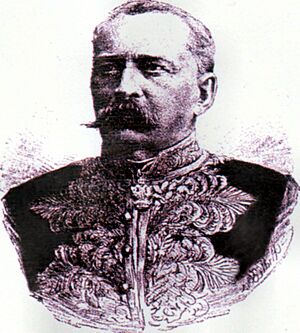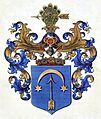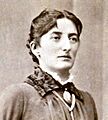Alexander Wassilko von Serecki facts for kids
Quick facts for kids
Alexander Wassilko von Serecki
|
|
|---|---|

Wassilko von Serecki in 1890
|
|
| Landeshauptmann of Bukovina | |
| In office 1870–1871 |
|
| Preceded by | Eudoxiu Hurmuzachi |
| Succeeded by | Eudoxiu Hurmuzachi |
| In office 1884–1892 |
|
| Preceded by | Anton Kochanowski von Stawczan |
| Succeeded by | Ioan Lupul |
| Personal details | |
| Born | 17 December 1827 Berhometh, Austrian Empire (now Berehomet, Ukraine) |
| Died | 20 August 1893 (aged 65) Lopuszna, Austria-Hungary (now Lopushna, Ukraine) |
| Political party | Autonomist Romanian Conservative Party |
| Spouse |
Katharina von Flondor
(m. 1859–1893) |
| Relations | Georg Wassilko von Serecki (son) |
| Alma mater |
|
Freiherr Alexander Wassilko von Serecki (born December 17, 1827 – died August 20, 1893) was an important politician in Austria-Hungary. He was from a Romanian family. He served as the Governor (called Landeshauptmann) of the Duchy of Bukovina. He was also a member of the Herrenhaus, which was the Upper House of Austria's main parliament, the Imperial Council.
Contents
His Life and Work
Early Life and Education
After finishing high school in 1846, Alexander Wassilko von Serecki studied philosophy and jurisprudence (the study of law) at universities in Czernowitz and Lemberg. From 1850, he worked as a lawyer in Czernowitz. After 1859, he took over managing his father's large estates.
Starting in Politics
Wassilko von Serecki joined a political group called the "Autonomist Romanian Conservative Party." His political journey began in 1862. That year, he was chosen to represent his party in the Council (or Diet) of Bukovina.
In 1863, he helped start a group called "Junimea." This was a very important Romanian intellectual, cultural, and political group in the 1800s. He continued to support it and later became an honorary member.
Role in the Imperial Parliament
On February 24, 1867, Emperor Franz Josef chose Alexander Wassilko von Serecki to join the Herrenhaus. This was the Upper House of the Imperial Parliament in Vienna. He took over this role from his father. For thirteen years, he was the only person from the Duchy of Bukovina in this important chamber. Later, in 1880, the Metropolitan of Bukovina and Dalmatia, Sylvester Morariu-Andriewicz, also became a member.
Governor of Bukovina
Alexander Wassilko von Serecki served as the Governor of the Duchy of Bukovina twice. First, from 1870 to 1871, and then again from 1884 to 1892. During his time as governor, he worked hard to limit the power of the Eastern Orthodox Church. He did this with other members of parliament, like Hormuzaki, Costin, and Flondor. They successfully pushed for these changes in Vienna.
Because he had a good relationship with the court in Vienna, he achieved another important goal in 1876. He got the Romanian language approved for teaching at the Lyceum (a type of high school) in Suczawa. A few years later, permission was also given to teach in Romanian in special high school classes in Czernowitz.
He believed that all citizens should have the right to practice their own religion and culture freely. He also thought their native language should be recognized. However, he always stressed that this should happen under the rule of the Habsburg monarchy and the Emperor. After the Kingdom of Romania was formed in 1881, Alexander strongly opposed the idea of Bukovina joining Romania.
In his opening speech as governor on July 22, 1884, he spoke in German to the Bukovina Parliament. He asked all members to work together to keep Bukovina's independence within the Austrian state. He also supported the legal recognition of German, Romanian, and Ruthenian languages. He emphasized that German was the common language that connected all the peoples in the monarchy. He saw German as the main official language because of its history. He is considered one of the first people to think about a united Europe of nations.
In 1885, the Emperor gave him the Order of the Iron Crown 2nd class. In 1888, when he was reappointed as governor, he was given the title of "Real Privy Councillor."
His sudden death in 1893 caused great sadness among the people, his political friends, and even his opponents.
Family Life
Alexander was the son of Baron Iordaki (born March 4, 1795; died November 6, 1861) and Pulcheria Kalmuţchi (born November 3, 1811; died August 22, 1895). On June 16, 1859, he married Katharina von Flondor. She was born on July 21, 1843, and died on December 27, 1920. Her father was a landowner named Jordaki Ritter von Flondor.
Alexander and Katharina had four sons:
- Georg (1864-1940): He also became an Austro-Hungarian statesman and Governor of the Duchy of Bukovina.
- Stephan (born June 10, 1869; died August 31, 1933): He was an officer and a counsellor in the Ministry of the Interior.
- Alexander (born February 2, 1871; died July 21, 1920): He was a Chamberlain for Archduke Henry Ferdinand of Habsburg-Toscana. He was also a Lieutenant-Colonel and a deputy head of the Evidenzbureau.
- Viktor (born May 19, 1872; died July 13, 1934): He was an Orthodox military priest, then an archdeacon and Exarch in Vienna.
In 1905, Emperor Charles I of Austria gave them the title of "Kämmerer" (Chamberlain) of the empire. On August 29, 1918, they were made Austrian Counts Wassilko von Serecki. In 1907, the family was also given a hereditary membership in the Upper House of the Austrian Imperial Council.
His Properties
Alexander Wassilko von Serecki was the largest landowner in Bukovina, owning 28,000 hectares (about 69,000 acres). He was also one of the largest landowners in the entire Austria-Hungarian Empire. Since his brothers did not have children, Emperor Franz Joseph I allowed him in 1888 to set up a "Realfideikommisss." This was a special legal arrangement to keep his land together in the family.
To improve farming on his land, he founded two villages. He named them after himself and his wife: "Alexanderdorf" (in 1863) and "Katharinendorf" (in 1869). He invited German-Lutheran farmers from the area and from Galicia to settle there. He also built German schools in both villages (in 1870 and 1875). The families who settled there paid small, regular fees to help maintain the schools. Because the closest Lutheran Church was 70 kilometers away, he built a Lutheran church for the two villages.
In 1886, the Baron bought the "Wassilko-Palais" in Czernowitz. This was a building at Herrengasse No. 38. He also finished building "Berhometh Castle," which was later destroyed by fire during World War I in 1915. In 1889, the Baron also ordered the building of a new church in Berhometh.
In 1924, a side street of "Herrengasse" in Czernowitz was renamed "Wassilkogasse" to honor his family. The famous German-Jewish author Paul Celan grew up on this street.
Images for kids
 | Toni Morrison |
 | Barack Obama |
 | Martin Luther King Jr. |
 | Ralph Bunche |






